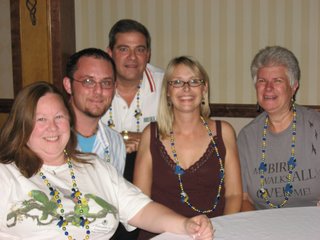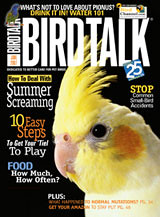Tuesday, August 29, 2006
Katrina Remembered
It's been about a year since Hurricane Katrina devastated New Orleans and the surrounding area. At Bird Talk, we heard many heart-wrenching tales of lost pets, homes and aviaries, but we were also told of a number of heroic actions by people in the bird community. It was a time to either be pulled apart or pulled together. In the next issue of Bird Talk, December 2006, we'll remember some of those tales with stories from readers who lived through Katrina.
Being alone during a tragedy can make it feel 100x worse. Many people turned to their friends, family and coworkers for help in the aftermath of the hurricane. One New Orleans woman, since relocated to Texas, found that support in a new pet, her cockatiel Bonnie. The story was reported by CBS 11TV in Dallas-Fort Worth. You can read about her experience here.
Being alone during a tragedy can make it feel 100x worse. Many people turned to their friends, family and coworkers for help in the aftermath of the hurricane. One New Orleans woman, since relocated to Texas, found that support in a new pet, her cockatiel Bonnie. The story was reported by CBS 11TV in Dallas-Fort Worth. You can read about her experience here.
Monday, August 28, 2006
Calling All Canadians
If you're a Canadian bird breeder, rescue or anyone that keeps 100+ birds, the Canadian government is offering a free Bird Health Basics poster and brochure to protect your flock from dangerous avian diseases such as bird flu and Newcastle.
The full press release can be read here.
The full press release can be read here.
Friday, August 25, 2006
Bird Mascots
Growing up, my high school's mascot was a seagull. (I've since learned that this is a vague and inappropriate term.) It suited our school's location on the northeast coast, but rival schools laughed and called us the "trashpickers" instead. In my adolescent insecurity, I'm sure I laughed along with them. A bird doesn't seem like much of an enemy combatant when stacked against the Trojans, bears or Titans. Then again, my favorite sports team, the Red Sox, don't have the most powerful icon - a pair of red booties? - but it doesn't stop them from making a run for first each year. Nor does it discourage the legion of fans that call themselves Red Sox Nation. The faithful remain every season (and off-season).
When I went to college, our school mascot was again a bird, although a more stately one - the eagle. The ultimate American avian symbol. We see our own values and goals in that beautiful bird, freedom, intellect and strength. But could an eagle beat the Gators? or the Devils?
Why, when there are so many ferocious animals out there, do some schools and companies take on birds as their mascots. Pennsylvania seems to have a real obsession with birds. They have the Philadelphia Eagles football, Philadelphia Flyers basketball, and the Philadelphia Phillies baseball team has some strange dancing green bird mascot (think of a green Big Bird with a huge nose). In other areas, there's the Baltimore Orioles, the Doyle Owl of Reed College, Hokie Bird of Virginia Tech, the Mighty Ducks (how mighty can ducks be?) and many, many more. The U.S. Air Force's mascot is a bird (for obvious reasons).
It seems that most people are drawn to the unique ability of birds to fly. To soar over the competition and any threat with more capability than any human athlete could ever aspire to (Michael Jordan be damned). Their impeccable eyesight and uncanny observation abilities also place high on our list of envious attributes.
Although a bird might not win in fist - er, wing - fight, they still capture our awe and respect.
When I went to college, our school mascot was again a bird, although a more stately one - the eagle. The ultimate American avian symbol. We see our own values and goals in that beautiful bird, freedom, intellect and strength. But could an eagle beat the Gators? or the Devils?
Why, when there are so many ferocious animals out there, do some schools and companies take on birds as their mascots. Pennsylvania seems to have a real obsession with birds. They have the Philadelphia Eagles football, Philadelphia Flyers basketball, and the Philadelphia Phillies baseball team has some strange dancing green bird mascot (think of a green Big Bird with a huge nose). In other areas, there's the Baltimore Orioles, the Doyle Owl of Reed College, Hokie Bird of Virginia Tech, the Mighty Ducks (how mighty can ducks be?) and many, many more. The U.S. Air Force's mascot is a bird (for obvious reasons).
It seems that most people are drawn to the unique ability of birds to fly. To soar over the competition and any threat with more capability than any human athlete could ever aspire to (Michael Jordan be damned). Their impeccable eyesight and uncanny observation abilities also place high on our list of envious attributes.
Although a bird might not win in fist - er, wing - fight, they still capture our awe and respect.
Friday, August 18, 2006
Taking Flight
My internship has come to an end and I couldn't be happier about the magazine to which I was assigned. Coming into the job with very little knowledge of pet birds, I was fortunate to have assignments that required me to quickly learn about many of the bird species and some of the potential medical conditions.
Throughout the 10 weeks of the internship I was pleased to discover how often I was able to apply my biology background to the job. Whether it was moderating discussions on the forums about hybrids or thumbing through an avian medicine book, I was pleased to be constantly stimulated by the science behind pet birds.
I'll soon be on the road back to Texas (one of the top 3 bird-owning states, I learned from the March 2005 BT, woohoo!) and after lunch with the BT team this afternoon, I have my heart set on getting a companion bird once I settle into my new home. There is no one better to discuss your intentions to finally get a pet of your own than with the editors of a pet-related publication. They help you assess your circumstances and decide what type of animal would best suit your lifestyle. I believe we decided a bird is best for me. A Poicephalus maybe?
Whatever pet I decide on, I feel fortunate to have spent my summer after graduation not only learning more about the industry I chose as a career path, but also discovering a new area of interest in pet birds. Bird or no bird, I will proudly carry my BIRD TALK Magazine bag around anywhere I go, with hopes that I'll attract bird enthusiasts who I can reminisce with about my days at BT.
~Ashley
Throughout the 10 weeks of the internship I was pleased to discover how often I was able to apply my biology background to the job. Whether it was moderating discussions on the forums about hybrids or thumbing through an avian medicine book, I was pleased to be constantly stimulated by the science behind pet birds.
I'll soon be on the road back to Texas (one of the top 3 bird-owning states, I learned from the March 2005 BT, woohoo!) and after lunch with the BT team this afternoon, I have my heart set on getting a companion bird once I settle into my new home. There is no one better to discuss your intentions to finally get a pet of your own than with the editors of a pet-related publication. They help you assess your circumstances and decide what type of animal would best suit your lifestyle. I believe we decided a bird is best for me. A Poicephalus maybe?
Whatever pet I decide on, I feel fortunate to have spent my summer after graduation not only learning more about the industry I chose as a career path, but also discovering a new area of interest in pet birds. Bird or no bird, I will proudly carry my BIRD TALK Magazine bag around anywhere I go, with hopes that I'll attract bird enthusiasts who I can reminisce with about my days at BT.
~Ashley
Monday, August 07, 2006
AFA 2006
 This past week I attended my second Avian Federation of Aviculture (AFA) annual convention, and it was even better than the first. Each year, AFA assembles some of the most knowledgeable minds of the avian community for a multi-day convention that includes - if you're so inclined - late night socializing, dancing, raffles, a banquet and of course, a stellar line up of seminars.
This past week I attended my second Avian Federation of Aviculture (AFA) annual convention, and it was even better than the first. Each year, AFA assembles some of the most knowledgeable minds of the avian community for a multi-day convention that includes - if you're so inclined - late night socializing, dancing, raffles, a banquet and of course, a stellar line up of seminars. Some of this year's multi-cultural speakers included Joseph Forshaw of "Parrots of the World" fame; Dr. David Waugh and Matthias Reinschmidt of Loro Parque in Spain; avian behavioral consultants Mattie Sue Athan, Barbara Heidenreich and Dr. Susan Friedman; field researchers Dr. Donald Brightsmith and Carlos Bianchi; Dr. Irene Pepperberg and our very own Melissa Kauffman.

Seminars run the gamut from conservation to pet bird behavior problems and aviary management. There seems to be something for everyone, pet bird owners as well as breeders and aviculturists. And the talks are hardly limited to parrots. Canadian breeder Bryan Emery discussed "Songbirds in Aviculture" and Lynn Hall took on fruit doves and pigeons.
While between seminars, Melissa and I, along with Bird Talk sales representatives Louis Brandt and Bill Rauch, manned the Bird Talk booth where we were able to talk to readers. This was probably one of the most enjoyable times of the convention. We rarely get that type of one-on-one interaction with our readers.
Of course, the raffles and vendors are another highlight of the event. I won twice with the raffle, taking home a selection of candles, perches, food treats and, my favorite, two framed sets of bird-themed stamps. I also picked up a bird decorated tie from Loro Parque for my Dad, and PVC swing from Bird Toys, Etc. Anyone that regularly attends these bird events knows to pack an extra bag to tote home the new goodies, and I did just that.
Check out the American Federation of Aviculture's website for details on next year's event.
-ROSE
